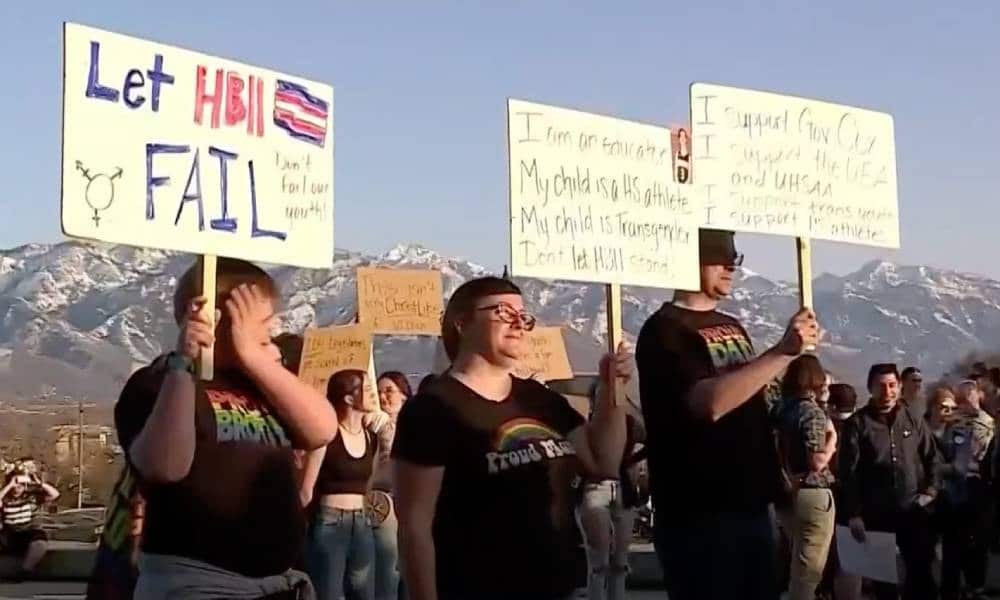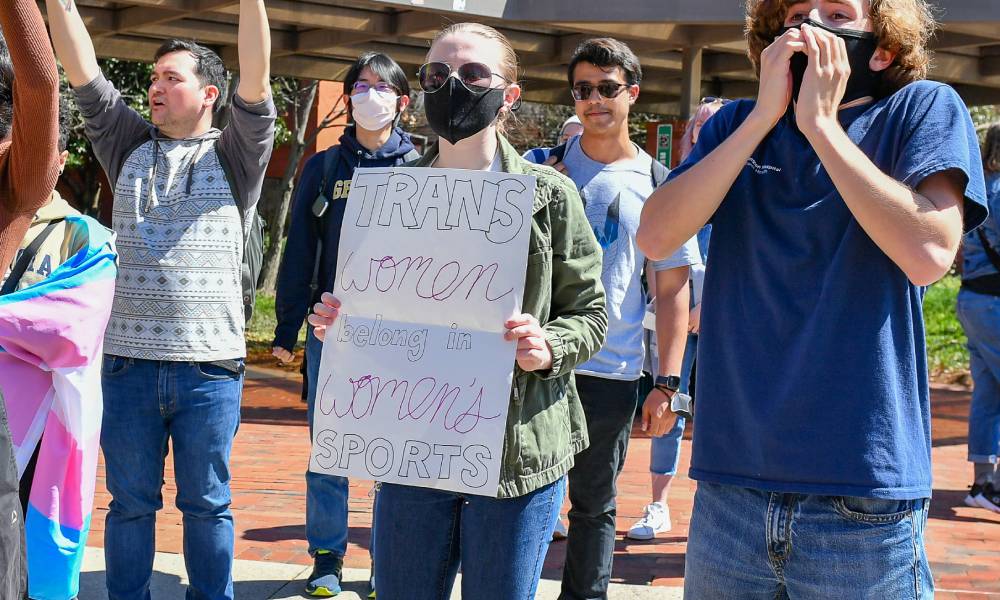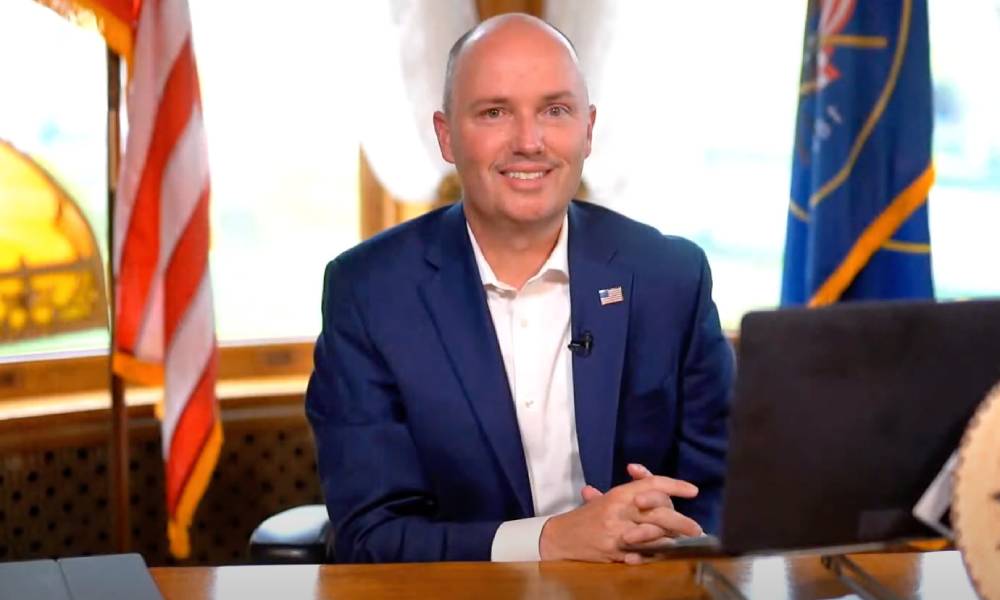Families sue Utah over hateful, unscientific ban on trans women and girls competing in sports

Families of two trans teens in Utah are suing the state over legislation that bans trans students from participating in girls’ sports. (WRTV Indianapolis)
Two supportive families of trans youth are suing Utah after Republican lawmakers approved legislation banning trans girls from competing in school sports.
The families have alleged that House Bill 11 (HB 11) – which was passed into law in March despite governor Spencer Cox’s veto – violates multiple provisions of the Utah constitution as it singles out trans girls for “disfavoured treatment”.
The plaintiffs in the case are two trans teen girls who attend public schools in Utah and intend to compete on the girls’ volleyball and swimming teams. But they will both be “denied an equal opportunity to play school sports on the same terms as other girls” should the ban go into effect.
“The ban stigmatises and discriminates against plaintiffs because they are transgender girls, singles them out for less favourable treatment than other girls, denies them equal educational opportunities and subjects them to serious adverse effects on their physical and mental health,” the claim continued.
“The ban is based on unfounded stereotypes, fears and misconceptions about girls who are transgender. It is not supported by medical or scientific evidence.”
The families of the trans teens are represented by the ACLU of Utah, the National Center for Lesbian Rights and the law firm Wilson Sonsini Goodrich & Rosati.
One of the trans teens – who is referred to as Jenny Roe – described how playing volleyball during her last season was “one of the best times of my life”, and she just wanted to play on the team for her last year of high school.

People protest against Republican lawmakers passing House Bill 11, a trans sports ban, despite governor Spencer Cox’s veto. (NBC News)
Roe said that she felt like she was “part of something bigger than myself” by being part of the time and had finally found a way to “socialise with friends after being cooped up during the pandemic”.
“This law devastated me,” Roe added. “I just want to play on a team like any other kid.”
Roe’s mum Debbie added that the legislation felt like an “attack on our family” as parents just want their kids to feel fulfilled and be surrounded by those who “love and nurture them”.
“This law does the opposite – it tells my daughter that she doesn’t belong and that she is unworthy of having the same opportunities as other students at her school,” the mum said.
Jane Noe, the mother of a 13-year-old trans swimmer, said all of her children have “benefited from living” in Utah, but the trans sports ban “changes all of that”. Noe added that the family has had “serious conversations” about “whether we can stay here” as a result of the anti-trans legislation.
“It is deeply unsettling that the state would want to strip our child of the love and support she has received from her teammates, coaches and entire sports community,” Noe said.

People gather to support Lia Thomas and trans athletes at the NCAA Swimming and Diving Championships on 17 March 2022. (Rich von Biberstein/Icon Sportswire via Getty)
Christine Durham, former chief justice of the Utah Supreme Court and senior counsel at Wilson Sonsini, said the law “cannot survive constitutional scrutiny” as it “endangers transgender children”.
Republican state representative Kera Birkeland, the sponsor of HB 11, said the lawsuit was “not surprising” as legal challenges have been “threatened since the beginning” of the anti-trans bill, KUTV reported.
But Cox heavily questioned the necessity of the hateful legislation when he vetoed it back in March.
He told lawmakers in a letter explaining his veto that only four of the estimated 75,000 high school students participating in sports in Utah are trans. Cox noted that only one student was participating in girls’ sports in the entirety of the state.
The Democrat added that trans kids aren’t “dominating or winning trophies or taking scholarships” as conservatives have claimed. Instead, he said trans kids are “just trying to find some friends”, “feel like they are part of something” and just “get through each day”.

Utah governor Spencer Cox vetoed a trans sports ban as he said trans youth are “just trying to find some friends” and “feel like they are part of something” through athletics. (YouTube/Gov Spencer J Cox)
“Rarely has so much fear and anger been directed at so few,” Cox said. “I don’t understand what they are going through or why they feel the way they do. But I want them to live.”
Sadly, Utah is among over a dozen states that have passed trans sports bans in recent years.
Such legislation has been enacted in Iowa, South Dakota, Oklahoma, Arizona, Kentucky and Indiana in 2022 alone. In May, Tennessee extended its already existing anti-trans legislation, which was passed in 2021, to prohibit trans women from participating in women’s “intercollegiate or intramural sports” at the college level.
A trans sports ban was blocked from passing into law in Kansas after state legislators couldn’t get enough votes to overturn governor Laura Kelly’s veto.
LGBTQ+ rights advocates witnessed similar legislation being passed into law in Arkansas, Alabama, Florida, Mississippi, Montana, Texas and West Virginia in 2021.

